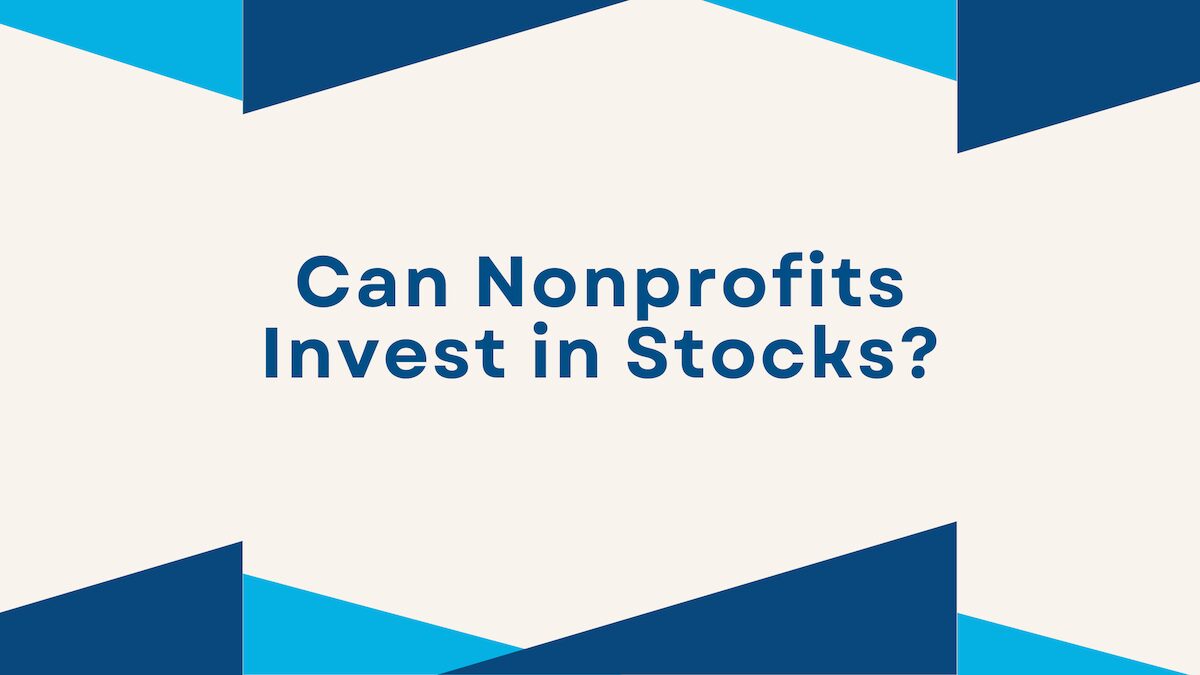Nonprofit organizations often rely on donations, grants, and other forms of fundraising to achieve their missions. But as financial needs grow, many nonprofits consider diversifying their revenue streams through investments.
This leads to a common question: Can nonprofits invest in stocks?
The answer is yes, they can! In this guide, we’ll explore the rules, benefits, and strategies related to stock investments by nonprofits.
Nonprofit Resources
The Charity Charge resource hub is dedicated to providing tips, tools, and information to help your nonprofit create and grow a modern organization. Learn more

Can Nonprofits Invest in Stocks?
Yes, nonprofits can legally invest in stocks, bonds, mutual funds, and other investment vehicles. As long as these investments align with the organization’s mission and comply with IRS regulations, nonprofits are free to explore the stock market.
Investment returns can provide nonprofits with additional income that supports their programs, enhances their financial stability, and ensures long-term growth.
However, the decision to invest in stocks should be made cautiously, with a clear understanding of the associated risks and rewards. It’s also vital for nonprofits to have investment policies that define how funds will be used, managed, and reported.
Legal Considerations for Nonprofits Investing in Stocks
Before diving into the stock market, nonprofits must navigate a few legal considerations:
- IRS Compliance: Nonprofits must ensure that their investment activities comply with IRS rules to maintain their tax-exempt status. While the IRS allows investments, it prohibits private inurement, meaning that nonprofit funds cannot be used to benefit insiders.
- State Laws: State laws may also impose restrictions on how and where nonprofits can invest funds. It’s crucial to review local regulations and seek legal advice to understand any specific requirements.
- Fiduciary Responsibility: Nonprofit board members and managers have a fiduciary duty to act in the best interest of the organization, which includes making prudent investment decisions.
- Unrelated Business Income Tax (UBIT): If investment activities generate unrelated business income, nonprofits may be subject to UBIT. This occurs when income comes from activities unrelated to the organization’s core mission.
How Stock Investments Benefit Nonprofits
Investing in stocks offers several advantages to nonprofits:
- Additional Income: Stock investments provide a potential source of income that can be reinvested into the organization’s programs and initiatives.
- Long-term Growth: With a long-term strategy, nonprofits can benefit from stock market growth, helping to build an endowment or reserve fund.
- Diversification: By investing in stocks, nonprofits can diversify their revenue streams, reducing dependence on donations and increasing financial stability.
- Capital Preservation: For organizations with larger endowments, investing in stocks can help preserve capital against inflation while still allowing for growth.
Types of Investments Nonprofits Can Make
Nonprofits can choose from various types of investments, depending on their risk tolerance and financial goals:
- Equities (Stocks): These offer higher growth potential but come with increased risk.
- Bonds: Generally safer than stocks, bonds provide a steady income stream.
- Mutual Funds: These allow nonprofits to diversify across various stocks and bonds, minimizing risk.
- Exchange-Traded Funds (ETFs): Like mutual funds, ETFs offer diversification but trade like stocks, providing more flexibility.
- Socially Responsible Investments (SRI): Many nonprofits prefer SRIs, which align with ethical principles and mission-driven goals.
Ethical Investing for Nonprofits
Ethical investing is a key consideration for nonprofits, as their investments must align with their mission and values.
Nonprofits often prioritize socially responsible investments (SRI) or environmental, social, and governance (ESG) criteria when selecting stocks.
This approach ensures that the organization’s financial strategies do not contradict its mission.
Risks of Investing in Stocks for Nonprofits
While investing in stocks can be beneficial, it comes with inherent risks:
- Market Volatility: Stocks are subject to price fluctuations, which can lead to significant losses in the short term.
- Liquidity Risks: While stocks are generally liquid, sudden market downturns can affect the ability to access funds when needed.
- Reputational Risks: If investments are not aligned with the nonprofit’s mission, it can damage its reputation and donor trust.
Best Practices for Nonprofit Stock Investment
To maximize returns and minimize risks, nonprofits should follow these best practices:
- Develop a Clear Investment Policy: This policy should outline investment goals, risk tolerance, asset allocation, and ethical criteria.
- Diversify Investments: Spread investments across different asset classes to reduce risk and increase returns.
- Engage Professional Advisors: Consider working with financial advisors who specialize in nonprofit investments to ensure compliance and effectiveness.
- Regularly Monitor Performance: Review investment performance periodically and adjust strategies as needed.
How to Start Investing in Stocks as a Nonprofit
If your nonprofit is considering stock investments, follow these steps:
- Assess Financial Health: Ensure the organization has sufficient funds and reserves before investing.
- Develop an Investment Strategy: Define objectives, risk tolerance, and timeline.
- Choose a Reputable Broker: Partner with a brokerage firm that understands nonprofit needs.
- Implement an Investment Policy: Get board approval for a formal policy that governs investment decisions.
- Monitor and Adjust: Track performance and make necessary adjustments.
Common Misconceptions About Nonprofit Investments
- Nonprofits Can’t Take Risks: Nonprofits can take measured risks as long as they comply with regulations and have clear policies in place.
- All Profits Are Taxed: Investment income may be taxed if it’s unrelated to the organization’s mission, but not all returns are subject to taxation.
- Investments Can Hurt Donations: In reality, diversified revenue streams can improve donor confidence by demonstrating financial stability.
Frequently Asked Questions
Can nonprofits lose their tax-exempt status by investing in stocks?
No, as long as investments comply with IRS regulations and don’t benefit private insiders.
What is the best investment strategy for nonprofits?
Nonprofits should adopt a diversified strategy that aligns with their mission, risk tolerance, and financial goals.
Do nonprofits need board approval to invest?
Yes, the board typically needs to approve investment decisions to ensure fiduciary responsibilities are met.
How often should nonprofits review their investments?
Nonprofits should review investment performance at least quarterly and make adjustments as needed.
Can nonprofits invest in foreign stocks?
Yes, but they must comply with both domestic and international regulations.
Is ethical investing mandatory for nonprofits?
While not mandatory, ethical investing aligns with mission-driven principles and is often preferred by donors and stakeholders.
Conclusion
Yes, nonprofits can invest in stocks, and doing so can offer financial growth and stability. With a well-defined strategy, legal compliance, and ethical considerations, stock investments can be a powerful tool to further a nonprofit’s mission. Always consult with financial advisors to ensure a successful investment approach.
















